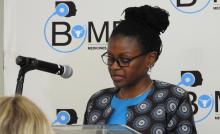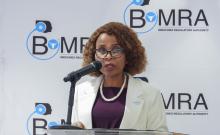Strengthening Regulatory Systems in Botswana
The World Health Organization (WHO) plays a pivotal role in supporting countries in strengthening their regulatory systems, and promoting equitable access to quality, safe, efficacious, affordable medical products, and health products. WHO mandated by Resolution WHA 67.20, supports countries to strengthen regulatory systems by building regulatory capacity in member states consistent with good regulatory practices and promoting regulatory cooperation, convergence and transparency through networking, work-sharing, and reliance.
The WHO Regulatory Systems Strengthening (RSS) programme has over the years, developed and refined a comprehensive support model to enhance regulatory systems in member states. This model includes the creation of tools for assessing and benchmarking National Regulatory Authority (NRA), enabling the identification of strengths and areas of improvement. Following the benchmarking process, an Institutional Development Plan (IDP) was tailored to leverage existing strengths and address identified gaps.
The WHO then provided technical support to implement IDP, complemented by ongoing monitoring to evaluate progress and measure impact. IDP’s serve as strategic blueprints, guiding government investments and technical assistance from WHO and other development partners to strengthen regulatory systems effectively. In response to a request from the Botswana Medicines Regulatory Authority (BoMRA), WHO initiated preparations for a pre-visit to support the benchmarking of Botswana's National Regulatory System. A series of three-tier planning meetings were held as part of these preparations. On July 9, 2024, WHO Botswana conducted a courtesy visit to BoMRA. During the visit, Dr. Juliet Bataringaya, Officer-in-Charge (OIC), and Dr. Madidimalo Tebogo met with BoMRA's Chief Executive Officer, Dr. Seima Dijeng, and his team. The meeting focused on areas of mutual interest and highlighted the progress made by BoMRA since its establishment in 2018. Dr. Dijeng acknowledged WHO's instrumental role in the development of BoMRA’s inaugural strategy in 2018.
The WHO team learned that BoMRA actively participated in various benchmarking initiatives, including the Southern Africa Development Community (SADC) self-benchmarking workshops in April 2019 and July 2021, which utilized the Global Benchmarking Tool (GBT) and Blood Safety assessment modules. Additionally, BoMRA engaged in self-benchmarking activities in February 2020, April 2021, and March 2022. The meeting also addressed preparations for the upcoming pre-visit by a team from WHO’s Regional Office for Africa (AFRO) and Headquarters, scheduled for July 18–19, 2024. The WHO pre-visit mission was meticulously prepared, organized, and conducted in alignment with Quality Management System (QMS) principles, adhering to the relevant guidelines and the manual for benchmarking national regulatory systems for medical products and developing institutional development plans. The pre-visit focused on the regulation of medicines (producing) and vaccines (non-producing). The WHO team included Ms. Andrea Keyter from WHO Headquarters and Mr. Joseph Kabatende from the WHO Regional Office for Africa (AFRO), with Dr. Juliet Bataringaya from the WHO Country Office in Botswana (Health Systems/OIC) participating as an observer.
The main objectives of the pre-visit were to:
• Conduct a preliminary overview of the status of the Botswana medicine and vaccine (non-producing) regulatory system against the WHO Global Benchmarking Tool;
• Update BOMRA’s Institutional Development Plan to address existing and/or potential gaps as well as prioritization of recommendations for implementation to continually improve the overall maturity level of the regulatory system;
• Explain and clarify queries regarding the WHO benchmarking process and methodology and provide information to facilitate BOMRA’s understanding of the type of information required; and
• Plan and prepare for a more effective and efficient benchmarking process including the agreement on tentative dates, activities, and timelines.
The BoMRA management and Board were introduced to the WHO Regulatory Systems Strengthening Programme and received an overview and demonstration of the WHO Global Benchmarking Tool. Participants were also briefed on the Coalition of Interested Parties (CIP), a newly established WHO network aimed at strengthening regulatory systems. The CIP promotes cooperation on regulatory matters, convergence, and transparency through networking, work-sharing, reliance, and capacity-building in Member States, aligning with good regulatory practices. The network also seeks to enhance the effectiveness of collective efforts and achieve a meaningful impact at the country and regional levels.
BoMRA presented the current status of each regulatory function, highlighting key changes and updates since March 2022. National documents were reviewed during the mission, including the national medicines policy, relevant legislation, guidelines, Standard Operating Procedures (SOPs), planned operational activities, existing records, reports, and studies.
The team engaged with the Ministry of Health, the Medicines Regulatory Board, and other relevant institutions and agencies involved in regulating medical products, such as the Expanded Programme on Immunization (EPI), the Clinical Trials Research Ethics Committee, and others, as applicable. Interviews covered various regulatory functions, including National Regulatory Systems, Registration and Marketing Authorization, Vigilance, Market Surveillance and Control, Licensing of Establishments, Regulatory Inspection, Laboratory Testing, and Clinical Trials Oversight. BoMRA and affiliated institutions conducted a review of the various regulatory functions assessed by the assigned benchmarking streams. This was followed by discussions and agreements on the findings and recommendations. The WHO presented the outcomes of the review, including measures needed to update or amend the final scores of indicators and sub-indicators.
As a result of the mission, the BoMRA team gained a clear understanding of the benchmarking process and methodology, as well as the commitment and cooperation required among all parties involved. The key recommendations from the mission included the following:
1. BoMRA is expected to update its Institutional Development Plan, provide additional evidence of its implementation, and identify areas requiring further support.
2. BoMRA should work towards implementing the developed roadmap to achieve Maturity Level 3. This may include activities such as assisted self-benchmarking, observed audits, vigilance system field visits, and capacity-building initiatives.
3. Based on the review of regulatory performance indicators during the mission, BoMRA should update the status of its medicines and vaccines (non-producing) regulatory system.







